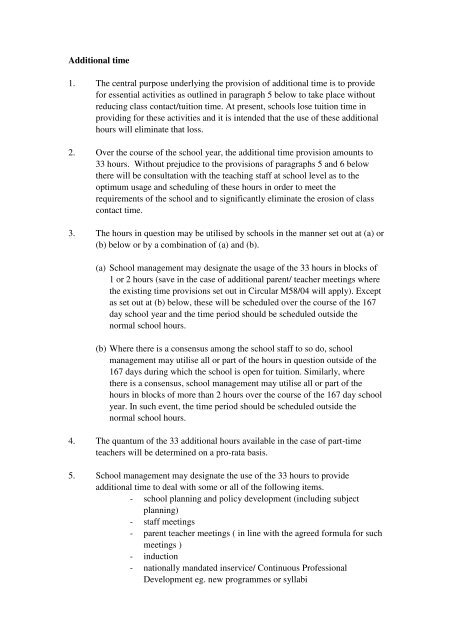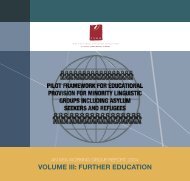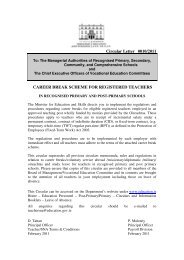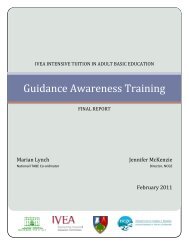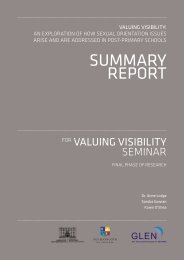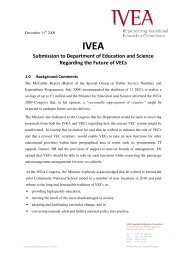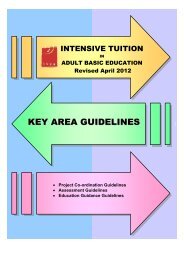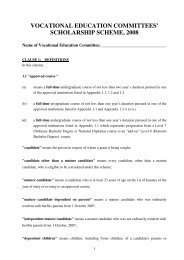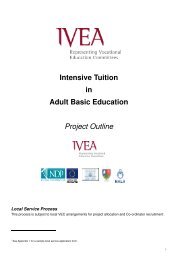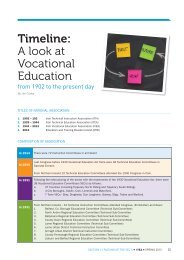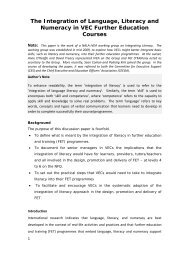croke park post primary - IVEA
croke park post primary - IVEA
croke park post primary - IVEA
You also want an ePaper? Increase the reach of your titles
YUMPU automatically turns print PDFs into web optimized ePapers that Google loves.
Additional time<br />
1. The central purpose underlying the provision of additional time is to provide<br />
for essential activities as outlined in paragraph 5 below to take place without<br />
reducing class contact/tuition time. At present, schools lose tuition time in<br />
providing for these activities and it is intended that the use of these additional<br />
hours will eliminate that loss.<br />
2. Over the course of the school year, the additional time provision amounts to<br />
33 hours. Without prejudice to the provisions of paragraphs 5 and 6 below<br />
there will be consultation with the teaching staff at school level as to the<br />
optimum usage and scheduling of these hours in order to meet the<br />
requirements of the school and to significantly eliminate the erosion of class<br />
contact time.<br />
3. The hours in question may be utilised by schools in the manner set out at (a) or<br />
(b) below or by a combination of (a) and (b).<br />
(a) School management may designate the usage of the 33 hours in blocks of<br />
1 or 2 hours (save in the case of additional parent/ teacher meetings where<br />
the existing time provisions set out in Circular M58/04 will apply). Except<br />
as set out at (b) below, these will be scheduled over the course of the 167<br />
day school year and the time period should be scheduled outside the<br />
normal school hours.<br />
(b) Where there is a consensus among the school staff to so do, school<br />
management may utilise all or part of the hours in question outside of the<br />
167 days during which the school is open for tuition. Similarly, where<br />
there is a consensus, school management may utilise all or part of the<br />
hours in blocks of more than 2 hours over the course of the 167 day school<br />
year. In such event, the time period should be scheduled outside the<br />
normal school hours.<br />
4. The quantum of the 33 additional hours available in the case of part-time<br />
teachers will be determined on a pro-rata basis.<br />
5. School management may designate the use of the 33 hours to provide<br />
additional time to deal with some or all of the following items.<br />
- school planning and policy development (including subject<br />
planning)<br />
- staff meetings<br />
- parent teacher meetings ( in line with the agreed formula for such<br />
meetings )<br />
- induction<br />
- nationally mandated inservice/ Continuous Professional<br />
Development eg. new programmes or syllabi
- approved school arranged inservice/ Continuous Professional<br />
Development<br />
- appropriate further education activities as set out in Appendix 1<br />
- substitution and supervision (see paragraph 6 below)<br />
6. The additional hours should be utilised for purposes of substitution and<br />
supervision only to the extent to which they are not fully utilised for the other<br />
purposes specified above. Teachers who are not contracted into the<br />
Substitution & Supervision scheme will have their residual hours designated<br />
for purposes other than substitution and supervision.<br />
7. The 33 hours are over and above additional time provided for under existing<br />
agreements in relation to parent/teacher and staff meetings. In the case of staff<br />
meetings school management may utilise some of the additional hours to<br />
remove the ‘half in’ element of these meetings.<br />
8. The usage of the additional hours will be outlined as appropriate in the school<br />
calendar which is made available to the school community at the<br />
commencement of each school year.<br />
Substitution and supervision<br />
Teachers who are participants in the scheme of substitution and supervision will be<br />
available for three timetabled class periods per week under this scheme (while leaving<br />
the current maximum number of hours used per teacher under the scheme the same as<br />
at present).<br />
Posts of Responsibility<br />
School management may reassign <strong>post</strong> holders to alternative responsibilities from the<br />
approved <strong>post</strong> of responsibility schedule appropriate to the level of the <strong>post</strong> (special<br />
duties or assistant principal) as required by the priorities and needs of the school.<br />
Reassignment within timetabled hours<br />
In circumstances where a teacher is timetabled for a class period(s) with a group of<br />
students that are participating in an out of school activity which requires the absence<br />
from school of another teacher or teachers, the teacher may be reassigned, in<br />
accordance with his/her timetable, to facilitate that absence.
Further education<br />
See Appendix 1<br />
Redeployment<br />
See Appendix 2<br />
General<br />
The Croke Park Agreement has as a core objective the need to ensure that the Irish<br />
public service continues its contribution to the return of economic growth and<br />
prosperity to Ireland, while delivering excellence in service to the Irish people. In<br />
keeping with this core objective and given the vital importance of education to our<br />
society, teachers will continue to cooperate with the implementation of change and<br />
will contribute to the realisation of national educational policies and objectives.
APPENDIX 1<br />
Further Education<br />
Teachers engaged in the delivery of Further Education will cooperate with each of the<br />
following as outlined below.<br />
Programme development:<br />
• Providers must develop new programmes to deliver new, migrated or<br />
harmonised awards.<br />
• Programme development is voluntary for individual staff members.<br />
• Programmes can be developed locally or nationally. Protocols for the<br />
development of National Programmes to be agreed between FETAC and the<br />
relevant VECs/Schools/Centres<br />
• For local development a block of hours, from the additional 33 hours, may be<br />
allocated for programme development to a teacher who has agreed to develop<br />
a programme – the number of hours to be agreed locally.<br />
• All new programmes will be developed using the new assessment procedures.<br />
Recognition of Prior Learning:<br />
• FETAC will develop national criteria for the recognition of prior learning.<br />
• A number of VECs will be invited to set up RPL centres where RPL<br />
applications will be processed.<br />
• It is the responsibility of the learner to provide the evidence to be processed in<br />
the RPL Centre.<br />
• The role of the individual teacher will be to assist the learner forward the<br />
evidence to the RPL Centre.<br />
Monitoring of QA Agreement:<br />
• Monitoring by FETAC is an integral part of each providers QA agreement<br />
with FETAC.<br />
• Under the QA Agreement teachers may be required to meet with the monitor<br />
and make available the relevant records and information.<br />
Assessments:<br />
• Teachers will continue to engage in the assessment procedures but within the<br />
framework of the new awards and programmes.<br />
• Teachers will prepare the assessments in the required format for internal<br />
verification and external authentication.
Internal Verification:<br />
• Teachers will, as heretofore, sign off on their results. These results will be<br />
entered electronically to FETAC as before.<br />
• Verification that the assessments are completed in compliance with FETAC<br />
requirements is signed off by the Principal or an appropriate staff member<br />
with a responsibility for internal verification in consultation with the teacher<br />
concerned.<br />
• The External Authenticator will sample learner evidence.<br />
External Authentication:<br />
• Teachers will, as heretofore, assist in preparing the assessments for<br />
examination by the External Authenticator who is appointed by the provider<br />
from a national panel of External Authenticators.<br />
• Where necessary teachers will be available, as heretofore, during external<br />
authentication.<br />
Results Approval Process:<br />
• Each school/centre must develop a Results Approval Panel in accordance with<br />
its QA agreement with FETAC.<br />
• Teacher participation on such panels is voluntary.<br />
• Where a result has to be reviewed teachers may be requested to engage in the<br />
discussion.<br />
Self Evaluation of Programmes & Services:<br />
• Self evaluation of programmes and services is an integral part of each<br />
providers QA agreement with FETAC.<br />
• Protocols for engagement in self evaluation to be developed locally in<br />
consultation with the teachers of the school/centre.<br />
• Teachers to facilitate the process of self evaluation in accordance with such<br />
protocols.
APPENDIX 2<br />
Redeployment scheme for teachers surplus to requirements<br />
other than in situations of school closure<br />
A procedure in relation to redeployment of <strong>post</strong> <strong>primary</strong> teachers, surplus to<br />
requirements in school closure situations, was agreed under the provisions of the<br />
Towards 2016 agreement. The scheme set out in this document will apply to<br />
permanent/C.I.D. <strong>post</strong> <strong>primary</strong> teachers surplus to requirements in situations other<br />
than school closure. It will also apply to other persons employed as teachers in a<br />
permanent/ C.I.D. capacity and who are surplus to requirements.<br />
Appointment of Director<br />
1. Following consultation with the parties, the Minister will appoint Directors/<br />
Assistant Directors (as appropriate) of the Redeployment Scheme who will be<br />
charged with implementing the scheme in accordance with the terms of this<br />
agreement and having regard to practical implementation issues. Each<br />
management body and teacher union may appoint an advisor/advisors to the<br />
Directors/ Assistant Directors. These advisors will be available to the Directors/<br />
Assistant Directors for consultation purposes at their discretion and will assist in<br />
the identification of issues of a practical or logistical nature.<br />
Notification of Vacancies<br />
2. All recognised second level schools, or where appropriate their respective<br />
VECs, where required by the terms of the scheme, must notify all applicable<br />
vacancies in the school to the Director of the Redeployment Scheme. It shall be<br />
a condition of the subsequent filling of such a vacancy that it was notified to the<br />
Director as soon as it arises and as part of this process. No appointment shall be<br />
made without the express written authority of the Director.<br />
3. The applicable vacancies for the purposes of the Redeployment Scheme are all<br />
permanent and temporary vacancies in whole or part <strong>post</strong>s, save where such<br />
<strong>post</strong>s cannot be deemed a vacancy by operation of law. In such event, the school<br />
should nonetheless notify the Director of the vacancy and stipulate the legal<br />
impediment to its being filled from the redeployment panel. In the operation of<br />
the scheme, the Director will have regard to the practicalities of filling short<br />
term vacancies by redeployment.<br />
4. In the case of each <strong>post</strong> or part of a <strong>post</strong> coming within the scope of the<br />
Redeployment Scheme, the school authority, or VEC as appropriate, will<br />
identify the reason for the proposed appointment and indicate its<br />
subject/programme preferences for the filling of the <strong>post</strong>. The Director may<br />
require a school or VEC to disclose any further information he/she considers<br />
necessary for the effective operation of the scheme.
Identification of Surplus Teachers<br />
5. An excess teacher situation arises when a school/VEC has in its employment<br />
one or more teachers in excess of its allocation subject to that surplus position<br />
representing more than 1% of the overall allocation of that school/VEC. The<br />
allocation figure for this purpose is the allocation on 31 December of the year<br />
prior to redeployment adjusted by policy decisions on the Pupil-Teacher Ratio<br />
and other teaching <strong>post</strong>s. Where in the case of a VEC, the surplus is distributed<br />
across a number of schools, the Director will have regard to any inequities<br />
arising from that fact in arriving at a view as to the required level of<br />
redeployment.<br />
6. A school/VEC in a surplus teacher situation is obliged to make a return to the<br />
Director of the Redeployment Scheme, identifying the teacher(s) to be<br />
redeployed. The method for determining the teacher(s) to be redeployed will be<br />
as follows:<br />
• In the first instance the school/VEC will ascertain if there is a<br />
member of its existing staff who wishes to be considered for<br />
redeployment on a voluntary basis. An expression of such interest in<br />
voluntary redeployment will specify the geographic area to which<br />
the teacher in question wishes to be redeployed. The Board of<br />
Management/ VEC for its part must also indicate its capacity to<br />
release the teacher in question without replacement and consent to<br />
the application.<br />
• Where a school/VEC identifies a teacher for voluntary redeployment<br />
it will, in addition, follow the procedures set out in paragraph 7<br />
below and identify a teacher for compulsory redeployment. In the<br />
event that it does not prove possible to redeploy the teacher who is<br />
the subject of the voluntary application, then the Director will<br />
proceed to redeploy the teacher nominated on foot of the procedures<br />
set out in paragraph 7 below.<br />
7. A school/VEC in a surplus teacher situation will follow the following procedure<br />
to identify the teacher who shall be nominated to the Director for redeployment.<br />
• In the first instance the school/VEC will consider the position of the<br />
most junior teacher and form a view as to whether the school/VEC<br />
could cope with the loss of that teacher from within its existing<br />
approved resources. If the conclusion is in the affirmative then that<br />
teacher will be nominated to the Director for purposes of<br />
redeployment.<br />
• Pending a review next year, the parties have agreed that seniority for<br />
the purposes of this scheme will be determined on the following<br />
basis:<br />
(a) Voluntary Secondary Schools - in accordance with paragraph<br />
D in Appendix Two of Circular PPT 29/02,
(b) VEC Schools - in accordance with the principles set out in the<br />
internal Teacher Transfer Agreement of March 1999,<br />
(c) Community and Comprehensive Schools - in accordance with<br />
Circular PPT 07/02.<br />
• In the event that the school concludes that it is not possible to cope<br />
without the most junior teacher then it will review the position of the<br />
second most junior teacher in a like manner to that set out above. It<br />
will then move on to review the position of each teacher in reverse<br />
order of seniority until such time as it reaches a nominee whose<br />
redeployment can be coped with from within existing resources.<br />
• The teacher(s) nominated for redeployment will be provided with a<br />
statement by the school setting out the basis for its decision and why,<br />
given the curricular needs of the school, that person was nominated<br />
rather than those more junior.<br />
8. Where a school/VEC is in a surplus teacher situation it is obliged, in all<br />
circumstances, to provide a nomination (or nominations if warranted by the<br />
level of surplus) to the Director.<br />
9. The procedure set out above must be followed until such time as the surplus<br />
position of the school/VEC is below one <strong>post</strong> or 1% of its overall allocation<br />
(whichever be the greater).<br />
10. In submitting details of the nominee for redeployment to the Director it will be<br />
open to the teacher so nominated to set out, in a form to be provided, details of<br />
where he/she considers that the process and procedures set out in this agreement<br />
were not complied with. The Director will consider these concerns and satisfy<br />
himself/herself that the process and procedures were followed in a correct<br />
manner.<br />
11. Where a school/VEC is of the opinion that its surplus position is strictly shortterm<br />
or transient by reference to its historical and projected enrolment, it will be<br />
open to it to present its evidence for this opinion to the Director. Where the<br />
Director is satisfied that the surplus is strictly transient and will not endure,<br />
he/she may, at his/her discretion, defer a decision in relation to redeployment.<br />
Redeployment of Teachers<br />
12. The Director will draw up a panel of teachers to be redeployed.<br />
13. In all cases the Director may assign a teacher to a school within a maximum<br />
radius of 50 kilometres from his/her existing school or where the teacher so<br />
requests from his/her place of residence. In the event that a teacher falls to be<br />
redeployed for a second or subsequent time, s/he will be given the option of<br />
choosing either his/her current school, previous school(s) or place of residence<br />
for the purposes of the operation of the scheme.
14. The Director will, to the greatest extent possible, seek to match a surplus teacher<br />
to a vacancy having regard to the curricular needs of the school and that surplus<br />
teacher’s qualifications and previous teaching experience.<br />
15. In the case of a teacher within the Community and Comprehensive School<br />
sector, the Director will assign that teacher to that <strong>post</strong> which, in the opinion of<br />
the Director, is most appropriate having regard to:<br />
• the curricular needs of the school<br />
• the teacher’s preference where more than one <strong>post</strong> exists<br />
• the desirability to take account of a teacher’s prior teaching<br />
experience and qualifications<br />
• travelling time for the teacher<br />
• any other factor deemed relevant by the Director<br />
16. (a) In the case of a teacher within the Voluntary Secondary School sector, the<br />
Director will, in the first instance and where practicable, assign that teacher to<br />
that <strong>post</strong> in the Voluntary Secondary School sector which is most appropriate<br />
having regard to:<br />
• the curricular needs of the school<br />
o the teacher’s preference where more than one <strong>post</strong> exists<br />
o the desirability to take account of a teacher’s prior teaching<br />
experience and previous schools<br />
• travelling time for the teacher<br />
o any other factor deemed relevant by the Director<br />
(b) In the event that, in the opinion of the Director, no such <strong>post</strong> exists in the<br />
Voluntary Secondary School sector, then the Director will assign the teacher to a<br />
<strong>post</strong> in the Community and Comprehensive School sector or the Vocational<br />
Education Committee sector having regard to:<br />
• the curricular needs of the school<br />
o the teacher’s preference where more than one <strong>post</strong> exists<br />
o the desirability to take account of a teacher’s prior teaching<br />
experience and previous schools<br />
• travelling time for the teacher<br />
o any other factor deemed relevant by the Director<br />
17. (a) In the case of teacher within the Vocational Education Committee sector, and<br />
in the event of a suitable vacancy not being available within that particular VEC<br />
scheme in the first instance the Director will, where practicable, assign the<br />
teacher to that <strong>post</strong> in the Vocational Education Committee sector which is most<br />
appropriate having regard to:<br />
o the curricular needs of the school<br />
• the teacher’s preference where more than one <strong>post</strong> exists<br />
o the desirability to take account of a teacher’s prior teaching<br />
experience and previous schools
• travelling time for the teacher<br />
o any other factor deemed relevant by the Director<br />
(b) In the event that, in the opinion of the Director, no such <strong>post</strong> exists in the<br />
Vocational Education Committee sector, then the Director will assign the<br />
teacher to a <strong>post</strong> in the Community and Comprehensive School sector or the<br />
Voluntary Secondary School sector having regard to:<br />
o the curricular needs of the school<br />
o the teacher’s preference where more than one <strong>post</strong> exists<br />
o the desirability to take account of a teacher’s prior teaching<br />
experience and previous schools<br />
• travelling time for the teacher<br />
o any other factor deemed relevant by the Director<br />
18. Having due regard to the sequencing arrangements and other factors outlined in<br />
this document, where the Director cannot readily match a teacher to a <strong>post</strong>,<br />
he/she may, at his/her absolute discretion, assign the teacher to that school<br />
whose curricular needs, in the opinion of the Director, most closely match the<br />
teacher’s qualifications and teaching experience. Where in consequence of a<br />
redeployment decision a school has a residual curricular need it is open to that<br />
school to apply through the curricular concession process in the normal way.<br />
19. The Director will satisfy him/her self that the teacher being redeployed will<br />
respect the ethos of the school to which he/she is being assigned and the teacher<br />
will agree to respect the ethos of the school in question.<br />
20. The assignments made by the Director will be binding on all parties and the<br />
teacher will become a member of the teaching staff of the receiving school and<br />
an employee of the board of management or VEC as appropriate, and, subject to<br />
the terms of paragraph 21, be governed by the terms and conditions applicable<br />
to that sector.<br />
21. Teachers redeployed in consequence of these arrangements will transfer their<br />
reckonable teaching service for promotion purposes in the previous school to the<br />
receiving school and this service will be reckonable for promotion purposes in<br />
the receiving school. This is subject to one exception that a teacher being<br />
redeployed from a voluntary secondary school to a receiving voluntary<br />
secondary school will not transfer reckonable teaching service for promotion<br />
purposes.<br />
22. All <strong>post</strong>-holders will retain their <strong>post</strong>s of responsibility allowance on a personal<br />
basis on redeployment. Post-holders will be required to carry out in-school<br />
management duties in the receiving school in line with the needs of that school.<br />
23. It will be open to the parties at the behest of a redeployed teacher or a receiving<br />
school to seek a review of a redeployment decision by the Director by 31 March<br />
of the year after redeployment took place. In conducting this review the Director<br />
will consider the extent to which the terms of the scheme were met and any<br />
other relevant factors raised by the parties. The Director may at his/her absolute
discretion either confirm the original redeployment or put in place a revised<br />
redeployment within the terms of the scheme.<br />
24. Where on foot of the operation of this scheme, a surplus teacher is redeployed<br />
into a temporary <strong>post</strong> and falls to be redeployed a second or subsequent time, the<br />
Director will make every possible effort to ensure that the subsequent<br />
redeployment is to a permanent <strong>post</strong>.<br />
Miscellaneous<br />
25. It will be an objective of the operation of this scheme that it be operated<br />
pragmatically having regard to practical implementation and logistical issues. It<br />
will be a further objective of this scheme that in any given year it will be<br />
finalised by 31 May so as to facilitate the filling of vacancies. This aspect will<br />
be reviewed for future years with a view to achieving improved timelines.<br />
26. In the course of discussions leading up to this agreement, the parties identified<br />
that there are situations where teachers in schools not in a surplus teacher<br />
position might wish to transfer on a voluntary basis to another area of the<br />
country. It is acknowledged that such voluntary movement, if provided for,<br />
could in some cases assist the operation of redeployment. Accordingly it is<br />
agreed between the parties that further discussions will take place in Autumn<br />
2011 with a view to having a pilot scheme in operation as soon as is practicable.


